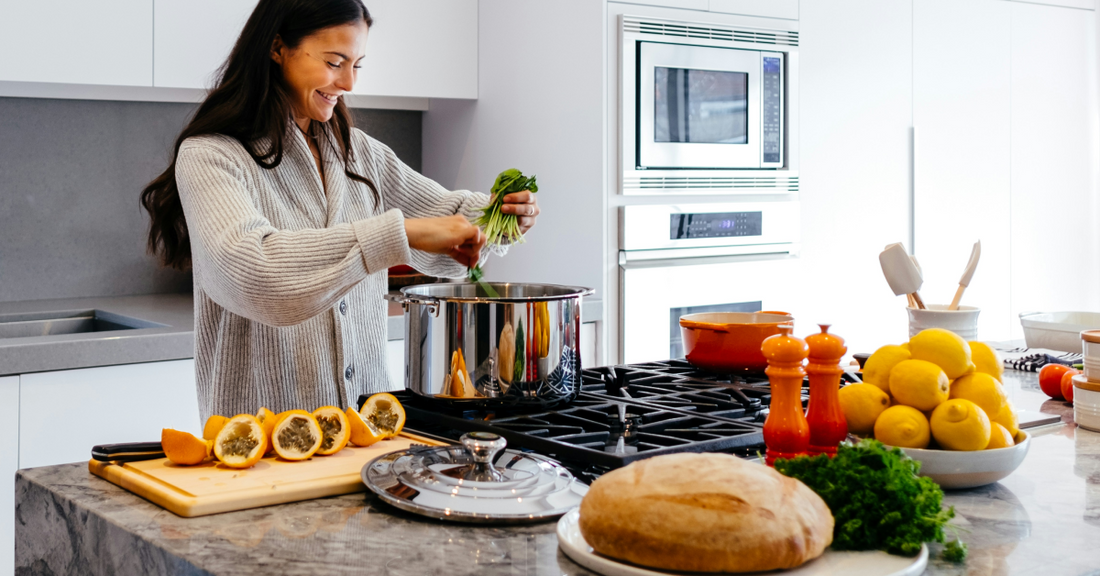Here we are again in this long, wet, icy stretch toward spring in the northern hemisphere. The winter holiday celebrations have come and gone, the new year is in full swing, and—for many—so are the winter blues. Especially in winter months, when the days are shorter and colder, many people are dreaming of sunnier times. Some find themselves in a full-blown bout of seasonal affective disorder (which was aptly given the acronym SAD). With all this cold, it only makes sense to bring some warmth into your life—and home. As you’re setting resolutions and mapping out healthy routines and habits for the new year, you might consider making cooking into an intentional winter ritual.
Is Cooking Good for Your Mental Health?
Cooking really is good for the soul, science says. Rather than going through the motions, it may be time to make cooking or baking into a creative winter ritual. As it turns out, cooking can boost mental health and emotional well-being—plus it'll make your house feel warm, cozy and smell delightful.
At the most basic level, cooking at home can improve your mental health because, as studies have shown, it tends to lead to healthier eating habits. And healthier diets have been proven to lead to healthier minds. The study “Food and Mood: How Do Diet and Nutrition Affect Mental Well-Being?” published in 2020 by the National Library of Medicine notes the following three “Key messages” on the relationship between food and mental health:
- Healthy eating patterns, such as the Mediterranean diet, are associated with better mental health than “unhealthy” eating patterns, such as the Western diet.
- The effects of certain foods or dietary patterns on glycemia, immune activation, and the gut microbiome may play a role in the relationships between food and mood.
- More research is needed to understand the mechanisms that link food and mental well-being and determine how and when nutrition can be used to improve mental health.
If this isn’t enough to inspire your winter soul cooking ritual, read on. The joy of cooking (to borrow the title of the classic cookbook), extends far beyond the physical relationship between healthy food and healthy mood.
How Does Cooking Boost Self-Esteem?
As an article by Melissa Locker published in Southern Living notes, cooking, baking, and many creative culinary endeavors have the potential to be good for the soul. Locker writes:
“While any Southern grandma would probably scoff at the need for a study on the idea of cooking as therapy—because, of course, retreating to the kitchen to whip up fried chicken, collards, and cornbread is good for the soul—one study found that baking classes boosted confidence and increased concentration. Another study revealed that a little creativity and creation in the kitchen can make people happier. That study, published in the Journal of Positive Psychology, suggests that people who frequently take on small, creative projects like baking or cooking report feeling more relaxed and happier in their everyday lives.”
You might also consider turning your winter cooking ritual into a weekly or monthly dinner party—or cooking party—which could help stave off both loneliness and hunger, while creating powerful community connections. Throughout history, communities and cultures have gathered around food. Cooking together and sharing food is a universal human custom that spans the globe—and has had a big impact on our human evolution. Anthropology research suggests food sharing has been key to hominid social lives since the times of our ancient cave-dwelling ancestors. It’s no coincidence that our modern winter holidays revolve around cooking and sharing meals.
What Is the Psychology Behind Cooking?
Cooking with friends or neighbors has the potential to connect us more deeply with each other. It also has the potential to make us much happier, according to scientific research. The 2017 article “Social Eating Connects Communities” published through the University of Oxford summarized research indicating that “the more often people eat with others the more likely they are to feel happy and satisfied with their lives.”
The study’s researchers looked at “the link between social eating and an individual’s happiness, the number of friends they have, their connection to their community, and overall satisfaction with life.” And the results showed that eating together increases “social bonding and feelings of well-being, and enhances one’s sense of contentment and embedding within the community.”
So get cooking, good looking! And if you’re in need of inspiration, you might find it on MUDWTR’s extensive library of creative, nourishing recipes (shameless plug, we know).
April M. Short is a journalist, editor, yoga teacher and feminine rites practitioner. She's an editor at the Independent Media Institute and helped co-found multiple psychedelics-focused media outlets. She has spent more than a decade in independent media working in both digital and print journalism, and her writing is published in the San Francisco Chronicle, LA Yoga, Salon, The Conversation and many others. Follow her yoga and ritual work on Instagram: @AprilClarkYoga.




